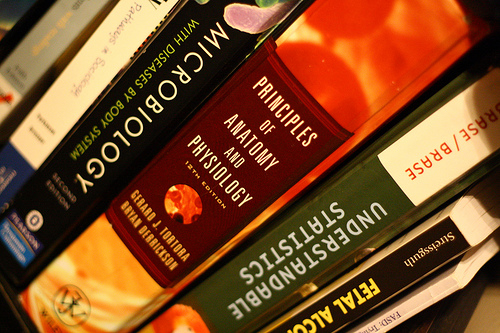Let’s continue with our Back-to-School Savings theme, shall we? I noticed quite a few folks getting ready for the fall semester to begin while I was out this weekend. Seeing carts full of dorm necessities always makes me a little nostalgic for my first few years at school. But you know what I don’t miss about college?
Paying for textbooks, a number of which I ended up hardly using. Many people are prepared for the costs of tuition, but you can’t always predict what textbooks will cost you every year. It only took me one semester to figure out that I was doing it all wrong and wasting a ton of money. Check out a few of these guidelines that I followed to cut my costs, and learn from my initial mistakes.
1. Buy used. I learned this lesson the hard way. Unless you’re required to purchase the absolute latest edition of a textbook, I’d suggest searching the used book store (likely near campus) or websites like Amazon or eBay for slightly older, used versions. They’ll work just as well, and you can save hundreds of dollars!
2. Check for online availability. In an effort to promote greener practices, sometimes books will be available for a discounted price if you purchase them as e-books instead of paper versions. Also check for articles in PDF form online instead of paying for them from various educational websites.
3. Borrow when you can. Taking a class with a friend? Split the cost of your required reading, save a few bucks, and gain a study buddy in the process. There are also websites now that allow you to rent your textbooks and send them back when you’re done, such as Chegg.com. You can even go old-school – check to see if the book you need is available at the library! You might even be more likely to study if your access is time-restricted.
4. If you can, wait until your classes start before you make a purchase. When I started my first semester of college, I thought I would get ahead of the game by finding out which books my classes had added to the “required reading” lists and I bought them all (brand new, sadly) a week before school started. Quite a few of them were seldom even opened. Try to scope out your syllabus and make sure you’ll actually be using the book in class, and that it’s not just listed as a reference text.
Want to get even more for your money? Don’t forget to sell your books back when you’re done, whether it’s at the campus bookstore (where you usually only make a fraction of the cost back, but something is better than nothing) or online (where you can set your own asking price). Unless you plan on using particular books as a reference in the near future, you’re better off passing them along to others looking to score extra savings for their upcoming classes.

